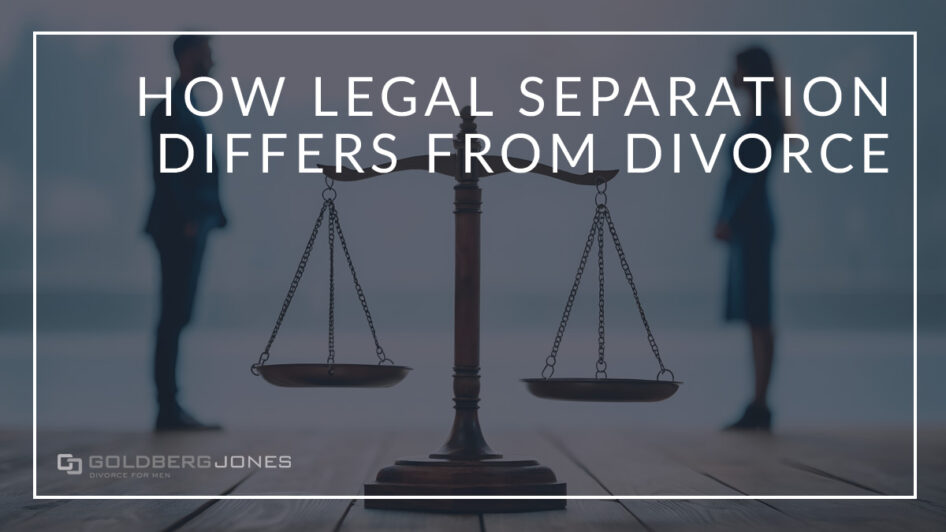Ending a marriage is a life-changing decision. This one act impacts almost every single part of your life. While divorce is the most common way to end a marital relationship, it’s not the only one. And it isn’t always the right fit for every situation. Legal separation is an option in certain circumstances when divorce isn’t.
What’s the difference between legal separation and divorce?
While divorce is final and absolute, legal separation is not so definitive.
In most cases, it serves as a de facto divorce. For all intents and purposes, the marriage ends, though it remains technically, legally intact.
This may sound strange—after all, by this point, you probably want to sever all ties with your spouse as soon as possible—but it does come with potential benefits. In some situations, divorce isn’t the ideal option.
Similarities
In most cases, legal separation functions similarly to divorce.
The couple splits up, they live apart, and a court order sets out all the specifics. During the process, you deal with the division of property, hash out child custody, create a parenting plan, and there can even be child support and spousal support orders.
Legal separation often looks a lot like divorce on a practical, day-to-day level. The mechanics are similar, and though one is final and permanent while the other is not, the finished product tends to be quite comparable.
Related Reading: What’s In A Divorce Decree?
Differences
Though divorce and legal separation often resemble one another, they have significant differences.
The biggest is obviously that in separation, you remain married, and in divorce, you do not.
Divorce dissolves a union once and for all. The marriage is, in no uncertain terms, over, and exes can go about their individual lives completely unfettered. You’re free to date, remarry, work, move, and live without any of the complications of marital entanglement.
In a legal separation, this often plays out similarly. However, the marriage remains official and in place.
-
- Though the individuals largely live their own lives, there remains a legal connection.
- You can’t marry someone else.
- You have to mark married on forms.
- There’s a lingering association.
Related Reading: Divorce and Retirement Mistakes
When Is Legal Separation The Best Choice?
Many reasons exist for choosing either divorce or legal separation. The causes are as different and unique as the reasons to end a marriage, and there are many different goals. For some, legal separation is a means to an end, a first step on the way to divorce down the road. In others, it becomes a more permanent state.
For some couples, legal separation provides space to deal with relationship issues with an ultimate eye on reconciliation. Living apart may provide much-needed space for spouses to work on themselves and any issues.
In some cases, legal separation offers time to figure out the particulars of a divorce. This includes financial issues, child custody, and more.
Some people choose to stay married because it’s easier for the kids. Others may be unwilling to divorce for moral, religious, or ethical reasons. It’s even possible for two people to be very much in love but simply unable to live together.
For families with children, legal separation sometimes proves less traumatic than divorce. Depending on how old the kids are, it may be easier to explain that mom and dad live apart than it is to dive into divorce and what that means. The process is often less stressful and hectic than divorce, which impacts everyone involved.
As we said, opting for legal separation over divorce depends on many factors.
Related Reading: How Do Courts Treat Your Debt in Divorce?
Financial Reasons
Many couples opt for legal separation for financial reasons. In certain cases, it provides the benefits of both divorce and marriage.
-
- For some couples, filing joint taxes saves money. There are hurdles to continuing to file taxes together after legal separation, though it’s possible on occasion. You should consult a professional ahead of time, however.
- Retirement benefits often hinge on the length of a marriage. Social Security kicks in after ten years of wedded bliss, so many people near this milestone choose to remain married.
- Pensions, military benefits, and other retirement allowances also have similar rules and regulations. Money and future financial windfalls are powerful motivators to hold on a bit longer.
- Continuing access to healthcare often factors into the decision when couples weigh divorce and legal separation. In most cases, employer-supported insurance plans don’t cover former spouses, though some do in legal separation. Again, there are potential pitfalls. Many plans look at legal separation and divorce the same way, so it’s vital to give your policies a close look. But healthcare is expensive, and especially in cases of chronic conditions, this may be a huge motivator.
- Legal fees and attorney costs are other factors to consider. When complicated cases involve lawyers, the cost of divorce and legal separation can be nearly identical. If not, the cost may be much less.
One thing to know is that if you go with legal separation and ultimately decide to divorce, couples often end up paying twice.
Related Reading: What is Mediation? Different Types of Mediation Styles
